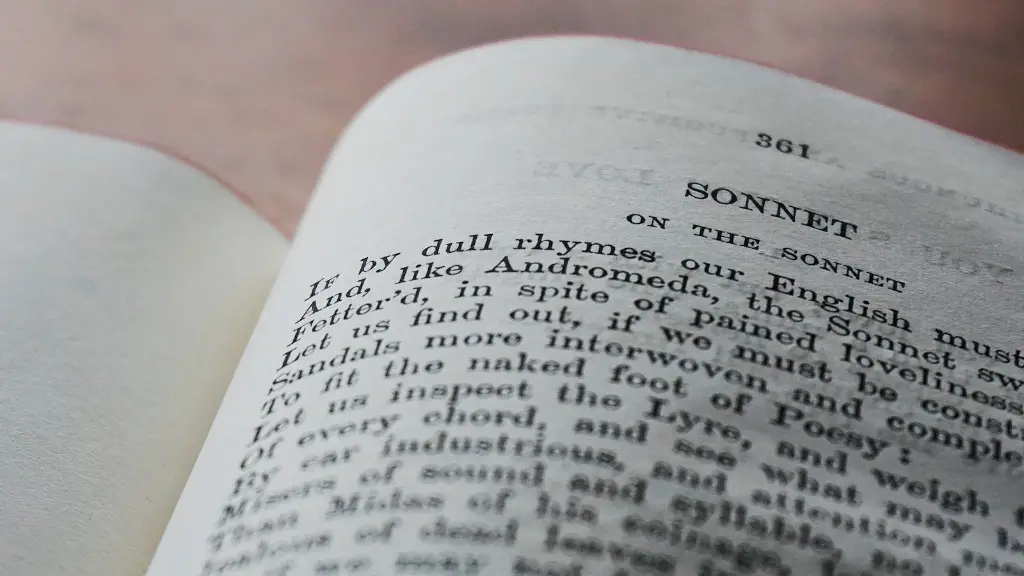How to Appreciate Someone’s Poetry
Poetry appreciation is the practice of understanding, analyzing, and evaluating a poem or poems. It involves examining the literary techniques used by the poet, emotions invoked by the poem, and individual response to the poem. Appreciating poetry is a skill that can be cultivated through study and practice, and today there are resources and communities dedicated to helping readers deepen their engagement with poetry. As a first step in learning to appreciate poetry, it is important to develop the skills necessary to analyze and interpret a poem. Once those skills have been honed, readers can then begin to appreciate the poem in a way that is meaningful to them.
Analyzing a poem begins with a few basic questions about the poem’s structure and content. Questions about language, tone, and subject matter can help identify areas of the poem that may draw the reader’s attention. For example, a reader might ask what images the poet is using, what metaphors they are using, or whether they are using any rhetorical devices. Asking these questions can help the reader better understand the poem and its nuances. Understanding the poem’s form is also key to accurately analyzing and interpreting the poem. Each type of poetic form has its own conventions and methods of communicating meaning, and it is important to recognize these conventions when appreciating the poem.
While it is important to be able to analyze and interpret a poem, one must also be open to a wide range of emotions when engaging with a poem. Poems can evoke a variety of emotions depending on the associations that the reader brings to the poem and their individual response to it. The poet’s use of language and imagery can also strongly influence the emotions that the reader experiences. It is important to recognize and embrace these emotions, as they can help enhance the appreciation of the poem. For example, if a poem evokes sadness, it may not be necessary to ignore those emotions in order to appreciate the poem – in fact, it can be helpful to allow those emotions to be expressed in order to truly appreciate the poem.
Finally, it is important to remember that everyone brings their own life experiences, thoughts, and feelings to a poem. This can influence the overall meaning they take away from a poem, and it is important to accept and respect each other’s individual interpretations and reactions. There is no one right way to appreciate someone’s poem, and it is essential to be open and accepting of others’ responses. Additionally, it is important to remember that the appreciation of poetry is subjective, and that the only true way to appreciate poetry is to be honest with oneself and to feel and express the emotions that the poem has evoked.
Developing an Understanding of Poetry
Developing an understanding of poetry can be a challenge for those unfamiliar with it, however, with a few simple steps, anyone can develop the skills necessary for poetry appreciation. The first step is to study the different forms and techniques of poetic writing, including the terminology used to discuss poetry. It is also helpful to read and study a variety of poems and to pay attention to the unique aspects of each. What do these poems have in common? How do these different aspects come together to help communicate a certain idea or emotion? Asking these questions is key to developing an understanding of poetry.
Additionally, it is important to become familiar with the work of a variety of poets, both classical and contemporary. Exploring the work of different poets can help a reader to gain insight into the historical and cultural context of each poem. The reader can also gain a better understanding of the various techniques used in various types of poetry. Reading a range of poetry thus helps to expand and deepen the reader’s knowledge and appreciation of poetry.
Finally, reading and discussing poetry with others can be an incredibly rewarding experience. Joining a poetry club or joining an online community dedicated to the appreciation of poetry can help open up conversations with others who can offer insight and advice. In-person or online discussions can help readers to discuss the intricacies of a poem and to glean a better understanding of the poem itself. Engaging in conversations with others is often the best way to truly appreciate the nuance and subtlety of a poem.
Recognizing the Poet’s Intention
The age-old adage “the poem is in the poet” rings true for poetry appreciation. A key component of poem appreciation is recognizing the poet’s intention and understanding their purpose for writing the poem. To recognize this, it is important to pay attention to not only the immediate content, but also the poem’s deeper meaning and the poet’s motivations and inspirations for writing the poem. Recognizing the poet’s motives allows the reader to gain a better understanding of the poem and a more meaningful appreciation of the poem.
It is also important to consider the context in which the poem was written. What was the poet’s social, political, or cultural context? Was the poem written in response to an event or experience? These questions can help the reader to understand the poem’s deeper resonance and meaning. Additionally, considering the poet’s sources of inspiration is also key to recognizing the intention behind the poem. Paying attention to the language used, the imagery presented, and the themes explored within the poem can give insight into the poet’s intentions.
When analyzing poetry, it is important to combine the objective analysis of the poem with the subjective insight presented by the reader. Only when both of these aspects are taken into consideration can the reader truly appreciate the poem in its entirety. Combining both the objective and the subjective thus enables the reader to gain a more meaningful appreciation of the poem and its underlying intentions.
Find Meaning It Relevant to Your Life
Finding a connection between a poem and one’s own life experience is often a powerful way for a reader to appreciate a poem. Establishing an emotional connection between the poem and one’s self can often be a powerful way to appreciate the poem and to find its greater meaning. To do this, it is important to examine the poem from a personal point of view and to explore the ways in which the poem reflects or relates to one’s own life.
It is also important to carefully consider how the poem speaks to the reader and to ask questions about what the poem is saying. For example, what feelings or ideas does the poem elicit? How does the poem reflect the reader’s life or beliefs? Taking the time to ask these questions can help to bring the poem to life and to draw out a meaningful connection between the poem and the reader.
Finally, it is also helpful to consider the larger universe of poetry and to see how the poem fits into it. Reading widely and connecting with other readers can help a reader to gain insight into the poem and to appreciate it in the broader context of poetry. Reading the work of other poets, for example, can help to illuminate the work of the poet being appreciated and to gain a better understanding of the nuances and subtleties of the poem.
Use Creativity to Explore and Appreciate Poetry
Finally, it is important to get creative when appreciating poetry. Developing a creative approach to exploring and appreciating poetry can help to draw out the poetry’s beautiful complexities and to find its deeper meaning. This can include writing a response to the poem, creating a visual representation of the poem, or doing an in-depth analysis of the poem using a specific framework. This can open up avenues of exploration and encourage readers to uncover the poem’s subtleties and complexities.
Engaging with the poem in a creative way also opens up opportunities to engage with the poem in a more meaningful way. When given the space to explore and express their thoughts and feelings in a creative way, readers can often find new ways to appreciate the poem and to discover its hidden meaning. Finally, getting creative when engaging with the poem can also help to cultivate a newfound respect for the art of poetry and for the skill of the poet.
Create a Dialogue With the Poet
Engaging in a meaningful dialogue with the poem’s author is another way to better appreciate the poem. Writing or responding to the poem can be an important part of the process, as it allows the reader to engage in a direct conversation with the poet. Engaging with the poem can help readers to better identify with and understand the poet’s intentions and feelings. This dialogue can also create an opportunity for the reader to gain insight into the poem and to gain a deeper understanding of the poet’s intentions and inspirations.
Moreover, conversing with the poet can also be a powerful way to enhance the appreciation of the poem. It can provide an opportunity for the reader to have an intellectual and emotional connection with the poem and to gain a better understanding of the poet’s motivations and inspirations. This intimate connection can thus enable the reader to appreciate the poem in a deeper, more meaningful way.
Finally, engaging in a conversation with the poet can also be a great way to learn and gain insight into the craft of poetry. Talking to the poet can give readers a greater understanding of the creative process and the challenges of writing poetry. This can also provide an opportunity to gain insight into the different approaches to poetry and the different ways that poets write and communicate their ideas.
Once a reader has developed the skills and understanding necessary to appreciate someone’s poem, it is important to be able to express that appreciation. This can be done through both the interpretation of the poem and through the sharing of one’s appreciation with the poet and other readers. When interpreting a poem, it is important to express one’s understanding of the poem in a meaningful way. What does the poem mean to you? What aspects of the poem stand out as important? How does the poem speak to you? Answering these questions can help to uncover the deeper meaning and significance of the poem.
When sharing one’s appreciation with the poet and other readers, it is important to be honest and express one’s own interpretation of the poem. Explaining one’s appreciation to others can help foster meaningful conversations and help readers gain a better understanding of the poem. Additionally, by sharing one’s appreciation with the poet, readers can show that they understand and appreciate the poet’s hard work and creative efforts.
Finally, it is important to remember that everyone’s reading and appreciation of a poem is valid, and that everyone has their own interpretation and experience with the poem. It is essential to respect and honor the individual interpretations of each reader and to be open to shared conversations and perspectives. This respect and openness is essential when it comes to truly appreciating a poem.





